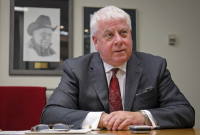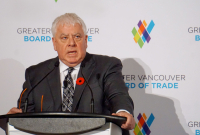Support strong Canadian climate journalism for 2025
Canada's pipeline regulator, the National Energy Board (NEB), is giving energy giant Kinder Morgan some new help to speed up its Trans Mountain expansion project — this despite recognizing that the Texas-based company was showing some "reluctance" to follow the rules.
The company has been urging the regulator to circumvent some of the constitutional powers of municipalities and the province of British Columbia after complaining that delays in local permits could jeopardize the completion of the multibillion dollar west coast oil pipeline.
The NEB, which has powers of a federal court, agreed to some of the Kinder Morgan's requests, including the introduction of a new process to fast-track the review of company complaints about delayed permit approvals and resolve them within three to five weeks. In December, the regulator also ruled that it would allow the company to bypass the bylaws of Burnaby in Metro Vancouver. But it didn't say why until it released a 26-page explanation last week that blamed the city for dragging its feet on approvals.
The moves have provoked outrage from both the British Columbia government and Burnaby, which say the regulator is stripping their powers to protect public safety, the environment and the economy.
A three-member panel of the NEB, David Hamilton, Alison Scott, and Philip Davies, wrote that the company finally filed some applications for permits in Burnaby in June 2017, more than six months after Prime Minister Justin Trudeau announced that the federal government was approving the pipeline expansion project in November 2016.
After June 2017, the regulator concluded that Burnaby's response was confusing and inefficient.
"After that point, Burnaby did, at times, indicate that (preliminary approval) application completeness was still a concern," said the ruling. "However, at other times, Burnaby cites the Project’s complexity or the fact that Burnaby has many other (preliminary approval) applications under review as being reasons for the delay. Even if it were true that significant material was still lacking after June 2017, there was no clear, consistent, or meaningful effort on Burnaby’s part to make it known to Trans Mountain what was specifically required to complete its applications."
No 'concerted effort' to make progress
Both the city and the province of British Columbia dispute the NEB's assessment, arguing that Kinder Morgan is to blame for failing to follow the rules for seeking permits.
After reading the ruling, Gregory McDade, a lawyer for the city of Burnaby, noted that the NEB found no evidence of political or deliberate interference to delay the process.
“Based on that, the NEB has no jurisdiction to do anything else. But instead they determined, based on God knows what evidence — because there certainly wasn’t any evidence of this — that in their opinion, the process was confusing and unreasonable and took too long,” McDade told National Observer in an interview on Friday.
The NEB ruling said that both the city and the company were slow to get the ball rolling after Trudeau gave them the green light.
“…There appears to have been a lack of a concerted effort on the part of both Trans Mountain and Burnaby to meaningfully engage or make any significant progress in late 2016, which carried over to early 2017,” said the NEB.
Burnaby is among the fiercest opponents of the pipeline expansion project since it would be the location of a new expanded oil terminal that would send out large tankers with exports containing bitumen, the tar-like heavy oil derived from Alberta’s oilsands region.
Oil companies say the pipeline is needed to boost growth and jobs by giving them access to new markets in Asia, while opponents, such as Burnaby and several First Nations say the project is too risky and will push Canada’s climate change goals out of reach.
Kinder Morgan says NEB changes are 'good news'
Kinder Morgan Canada president Ian Anderson praised the latest NEB decision.
“Provision of a process that is open, fair and provides certainty for all parties is good news and is an important component of the assurances we need for the successful execution of the Trans Mountain Expansion project,” Anderson said in a statement released on Thursday.
The company had previously warned this week that its project was now a year behind schedule, due partly to delays in getting permits. It now hopes that the pipeline will be in service by December 2020, after the next federal election in Canada.Trans Mountain didn't respond to a question from National Observer about why it failed to make a "concerted effort" to get its municipal permits from Burnaby before June 2017.
The B.C. government said it was considering an appeal.
“I’m angry on behalf of British Columbians,” said B.C. Environment Minister George Heyman in a separate interview with National Observer on Friday. “This is another example of the National Energy Board essentially finding a way to overrule British Columbia’s jurisdiction and assist Kinder Morgan in short-circuiting our legitimate permitting processes that we have a right to have.”
Heyman added that the NEB's decisions could harm the province’s capacity to protect its interests, its coasts and its economy.
“Kinder Morgan could advance no evidence whatsoever that we have been unreasonable in our processes or in handling their permits," Heyman said. "If there is a delay, if there are 900 or so outstanding permits, Kinder Morgan should look themselves in the mirror for failing to apply the diligence that they need to do to get their information in, in a timely and complete manner.”
He also noted that the NEB didn’t concede to all of the company’s requests to reduce oversight on permits.
The NEB panel also refused to require Kinder Morgan to pay for the costs incurred by municipalities as the result of disputes, because it says it expects the parties to work together in "good faith."
It also said it did not want to intervene in local processes for permits, saying it would only do so in limited circumstances.
"The Board is not an appropriate forum to work through any and all difficulties or disagreements encountered during permitting processes, and the generic process is not to be used as a negotiating tool," the NEB panel said. "Rather, the Board’s primary role is to ensure Trans Mountain complies with Project conditions."
McDade, Burnaby's lawyer, said he didn’t yet know if the city would appeal the NEB decision, but noted that Kinder Morgan’s legal challenge actually wound up stalling the municipal permitting process, which caused more delays.






Comments
This is outrageous. The safety of citizens in B.C. and the real risks of a tanker spill (not addressed unbelievably, in the NEB hearings as green house gas emissions resulting from the full life cycle of the bitumen being mined and shipped, was not considered. And here we are in a major earthquake risk zone.. I find the federal Trudeau govt. putting our coast at grave risk of a tanker spill and our commitments to the Paris Climate agreement impossible to meet far beyond looking out for what is best for Canada. What. Selling out the B.C. cost and giving lip service to preventing a climate catastrophe is in our interest? This is a major abandonment of B.C. and the future health of our climate. I urge everyone to make their views clear to the Trudeau govt. in no uncertain terms. Bill Eadie Nanaimo, B.C.
The NEB changes it's rules and processes to suit every company it helps through the approval process. They can't be called a applications since that implies there is a chance - no matter how slim - of refusal and that never happens at the NEB. For Energy East it's private meetings and advice from a former Premier lobbying for the company, for KM it's a complete pass on blocking endangered fish from spawning in a lot of rivers with huge rolls of plastic snow fence. It seems dumping plastic into water is only bad when there isn't money to be made. The system that allows routes to be approved without the knowledge or approval of those same properties is against all logic and reasonable expectation of landowners. Not only do they have no right to refuse, there is a whole right of way area around the pipeline they now can't use and get no compensation for. They can clearcut a swath across your property, destroy everything you hold dear, trash what is left with heavy machinery, poison the soil with incessant slow leaks they will neither be forced to clean up or compensate for, and you get to lump it. Your years of organic gardening is nothing to them and if they claim your garden area leaving you unable to grow your own meals anymore, you get to go hungry. If you are broken hearted and decide to sell, you find it's now plummeted in value and are forced to eat the loss. All for a US company that brags about paying almost nothing in taxes, has an abysmal safety and environmental record and will get billions in subsidies and corporate welfare over the life of this project. Canada's expropriation without compensation system is the fantasy of every evil corporation.
This is just a taste of what Harper's FIPPA will do: Circumvent Local Constitutional Governmental Rules and Regulations in favour of Foreign Companies with NO regard to local concerns of the consequences. The recent Condensate-Loaded Tanker burning then sinking off the coast of China could never happen here. All this because of a "LIKELY" higher price for Alberta TAR in the Orient.
WHY isn't the NEB indicating that the Trans Northern Pipeline company (oil products pipeline Quebec to Ontario, http://tnpi.ca ) is "taking too long" to remediate numerous landowners' properties contaminated by their leaking pipeline, starting over 50 years ago in the early 1960s, and these lands remain unremediated, and property owners remain uncompensated for their losses? !!!
The NEB, "expects the parties to work together in "good faith."... yet with the Quebec and Ontario Trans Northern pipeline landowners, there has been "No 'concerted effort' to make progress" from the pipeline company, no compelling direction from the NEB for the company to remediate lands and resolve any issues with these landowners, but rather silence and indifference.
This regulator does not know the meaning of "independent".
The NEB has made the choice to withhold information from the public about pipeline leaks, including those of Trans Northern’s.
http://www.canada.com/Energy+regulator+defends+withholding+information+…
However, two NEB board members wanted the Trans Northern pipeline shut down, deeming it unsafe. They were outvoted by the other board members, who knowingly are allowing an aged, unsafe and rotting pipeline to continue operating, at great risk to the environment and the public.
The NEB had issued Trans Northern at least three safety orders, which they failed to comply with, so the NEB issued them another “amending” safety order, hoping they would comply with the first three! “…The Amending Safety Order aggregates the outstanding requirements and undertakings related to the previous Safety Orders”… “The foregoing decision of the Board is not unanimous. Member Richmond and Member Ballem dissent from the majority decision on this matter.”
https://www.neb-one.gc.ca/sftnvrnmnt/cmplnc/rprts/brdlttrrdr/2016/SO-T2…
There’s no lack of documentation demonstrating the risks of continued operation of this pipeline!
https://www.nationalobserver.com/2016/10/24/news/two-members-regulator-…
and
https://www.nationalobserver.com/2017/08/14/news/leaky-pipeline-near-mo…
and
http://www.cbc.ca/news/canada/toronto/keeping-track-of-toronto-area-pip…
and
https://www.cityofkingston.ca/documents/10180/6437130/RAC_A0414-SchedB…
(this report details a broad history of TNPI's leaks, but does not capture numerous other “release” events since the pipeline's construction in 1952).
The serious deleterious environmental effects potentiated by this aging pipeline have also recently been documented in “Original Highways: Travelling in the Great Rivers of Canada”, by Roy MacGregor, Random House Canada, © 2017.
The Transportation Safety Board of Canada only chronicles pipeline “release” events and investigations over a very recent period of time on their website, “…report of an investigation that began in 1991 or later…”, leaving 40 years of Trans Northern’s leak history unseen on their website and not known to the public. One example, from 2002,
http://www.tsb.gc.ca/ENG/rapports-reports/pipeline/2002/p02h0052/p02h00…
Pipeline companies are bullies facilitated by the NEB. Trudeau’s government and Carr’s NRCan have perpetuated regulatory capture and the continued operation of Trans Northern's dangerous pipeline.
https://thetyee.ca/News/2013/03/30/Pipeline-Company-Bullies/
The NEB must be dissolved and reconstructed ("modernized"?) into an INDEPENDENT regulatory body not controlled by industry - a transparent body that can be trusted by Canadians to do the right thing.
TNPI'S credo:
"... keep product in the pipe ...", i.e. operate at all costs.
http://www.thewhig.com/2013/09/12/part-6-the-lesser-known-pipeline
It seems to me that the NEB is confused...in it's latest rulings they seem to have forgotten that they are supposed to act in the public interest...arms length from the oil industry. It was seem that they got that backward. Where is the public interest being served? I see Killer Morgans' interests are being well served. Maybe if there were some public people on the board and not a bunch of appointed "oil lackies" the public interest might have a chance. Not likely to happen anytime soon with the sycophantic Liberals licking the jack boots of the oil mafia.